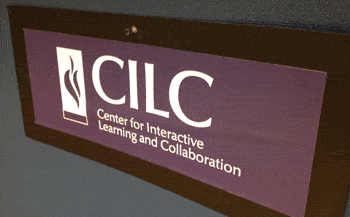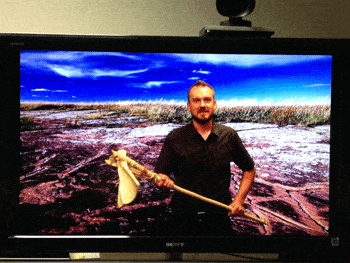After two flights from Alaska I continued my Winston Churchill Fellowship travels toward Indianapolis to visit the heart of North American video conferencing at the Center for Interactive Learning & Collaboration (CILC). Bringing together over 230 content providers, 10,000’s of teachers and over 90 countries the CILC has truly become a center of video conferencing over the past 20 years of operation. On a personal note it was great to catch up with Janet Zanetis who had spent the past couple of years in Australia working with schools and content providers and to finally meet Julia Heighway and Tonia Carriger in person after chatting via VC over the past few years. Through CILC I have been running virtual excursions for Fizzics Education to North American schools, often at 3:00am or similar due to the time differences so it was nice to chat without red eyes and a caffeine headache!

Center for Interactive Learning and Collaboration
CILC provides a multitude of services; professional development for school districts using video conferencing, consultancy to new content providers considering implementing distance learning systems and providing a booking system and evaluative service for schools to confidently seek out interactive lessons provided by cultural institutions. Additionally the CILC allows schools to meet other schools for shared classes on all key learning areas. Students can also create their own content and teach it to remote sites which gives students ownership over their learning, highlighting the age old premise that you cannot truly know your subject unless you can teach it competently to someone else!
It was interesting chatting about the variety of content available on the CILC website and how video conference content providers adapt their specialty into the distance learning environment. Some providers prefer to run distance sessions through traditional conference codecs where as others provide sessions via the cloud based H.323 products that mesh a multitude of hardware platforms. Regardless of the method chosen, the basic challenge remains in keeping the content relevant to the classroom situation. With this several questions must be addressed:
- How does the learner benefit from the workshop?
- How is interactivity maximized for the learner? In other words, what do they get to do?
- How does the lesson address the required National Standards and Common Core standards?
- Is the lesson pitched at the correct year level?
Schools have the option of booking workshops via a calendar or by requesting a specific time/date from a provider. The provider can offer sessions as a “one off” session or a series of classes as a unit of work. The schools have the option of placing money into a ‘Content Dollar Bank’ which means that classroom teachers can pay for the sessions used from an account created with the CILC, saving on administration issues for the schools as they can plan for their virtual excursions costs up front.
During my visit I, was fortunate enough to be introduced to Jack Matheson from Minnesota Historical Society. Running a program called ‘History Live’ the Minnesota Historical Society runs virtual excursions in front of a green screen units from one of their 26 sites that dot the State. Jack was fantastic, going through ten programs run for schools including historical perspectives on trade, ancient civilizations and military life. An interesting take on history is teaching the scientific method through discussions on historic inventors from Minnesota. Students can pole their answers into the session using their computers or tablets as well as create speech for cartoons of historical characters, the best answers being are placed onto the main green screen for students to see. Highly interactive and full of energy, the sessions clearly help teach history in a fun accessible way plus I love the meshing of science into the mix.

History Live video conferences
In the afternoon there was time to wander downtown Indianapolis. Some great architecture and a beautiful day to walk around.

Courthouse, downtown Indianapolis
Over the next day’s I’ll pop over to the Indianapolis Children’s Museum and the Nina Mason Pulliam Ecolab. Looking forward to seeing more ways of presenting science to the public!
All the best, catch you on the next post!























Comments